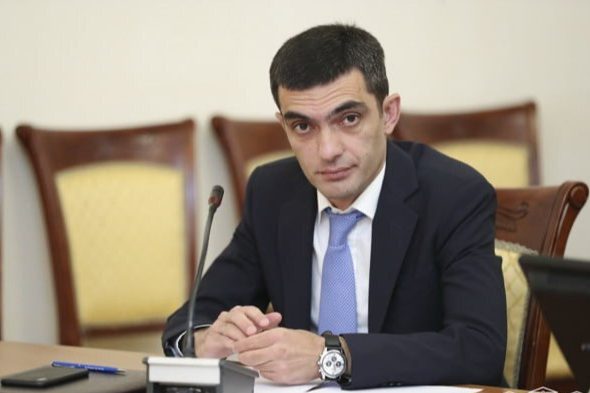“Azerbaijan-Karabakh conflict has never been considered an internal affair of Azerbaijan”։ Interview of Foreign Minister of the Republic of Artsakh Sergey Ghazaryan to Artsakhpress News Agency․
How would you comment on the statement made by the President of Azerbaijan on 18 April that the Armenians living in Karabakh should either accept Azerbaijani citizenship or look for another place of residence?
This is not the first time that the President of Azerbaijan has made statements that reveal the true intentions of Azerbaijan to ethnically cleanse Artsakh and expel its indigenous population from their historical homeland. The blockade imposed on Artsakh by the authoritarian leadership of Azerbaijan for more than four months is just one of the tools for the implementation of those criminal plans. Through coercion, the threat and use of force, Azerbaijan is essentially trying to force the people of Artsakh to accept the illegal demands of Azerbaijan, which contradict, inter alia, the peremptory norms of general international law.
The fact that the leadership of Azerbaijani is no longer hiding their criminal intentions demonstrates the insufficiency of the international response and engagement in efforts to end the ongoing blockade of Artsakh and prevent the genocidal intentions of Azerbaijan. In fact, the Azerbaijani authorities, acting in an environment of absolute impunity and permissiveness, are increasingly expanding the scale and geography of their crimes committed against the people of Artsakh and Armenia.
In this regard, I would like to emphasise that States, both individually and collectively, have an obligation to take effective and decisive measures to prevent the most serious crimes, primarily genocide and crimes against humanity, including ethnic cleansing and forced displacement. At the same time, the direct responsibility for preventing such crimes rests with the UN Security Council, a body that not only has the appropriate mandate, but also the necessary tools to stop the criminal intentions of Azerbaijan against Artsakh and its people.
In this context, it is regrettable that despite the commitment to prevent such serious crimes, representatives of some international organisations and states make political efforts that indirectly promote Azerbaijan’s illegitimate position and encourage their genocidal policy. We believe that such an approach by international actors, particularly those involved in the settlement of the Azerbaijan-Karabakh conflict and normalisation of Armenia-Azerbaijan relations, is not only unacceptable and counterproductive, but also fraught with unpredictable consequences for the entire region.
How would you comment on the statement of the Azerbaijani President that Karabakh is an internal affair of Azerbaijan?
The Azerbaijan-Karabakh conflict has never been considered as an internal affair of Azerbaijan, neither during the existence of the Soviet Union, nor in the subsequent period of the formation of independent states on the territory of the former Soviet Union. This is evidenced by the fact that after Artsakh (Nagorno-Karabakh), Armenia and Azerbaijan gained independence, the international community created a special mechanism for the settlement of the Azerbaijan-Karabakh conflict – the Minsk Process. The decision to create an international format to determine the final political status of Artsakh indicated that the community of States did not recognise Artsakh as part of independent Azerbaijan. In turn, Azerbaijan’s consent to be involved in the Minsk Process was also a recognition of the fact that the Nagorno-Karabakh conflict was not an internal matter of Azerbaijan.
In addition, the Armenian side has always emphasised that the Azerbaijan-Karabakh conflict is primarily a matter of human rights and freedoms, and first of all, the right of the people of Artsakh to self-determination. In this sense, according to international obligations, including those assumed by the state of Azerbaijan, issues of human rights and freedoms are of direct and legitimate interest to all States and are not exclusively an internal matter of any one State. There are many examples in the world where certain countries and international organisations have directly intervened in conflict situations to prevent genocide, massacres and other serious human rights violations. In situations where human rights and freedoms, including the collective rights of peoples, are systematically and grossly violated, only intervention of the international community and the free exercise of the right of peoples to self-determination can ensure a peaceful and civilized resolution of such situations, without resorting to the use of force, violence, forced deportation and ethnic cleansing.
Against the backdrop of the ongoing blockade, massive violations of the individual and collective rights of the people of Artsakh, and other aggressive actions, the efforts of the official Baku to present the Azerbaijan-Karabakh conflict as their internal affair are a clear attempt by the leadership of Azerbaijan to get carte blanche from the international community to continue the ethnic cleansing of Artsakh and expulsion of its indigenous people from their native lands. We consider Aliyev’s ultimatum statements and threats to unleash a new war to be absolutely unacceptable. The people and authorities of Artsakh remain committed to the path of freedom and independence they have chosen, and no threats or difficulties created by Azerbaijan can make us turn off this path.
Full interview on the source website.















